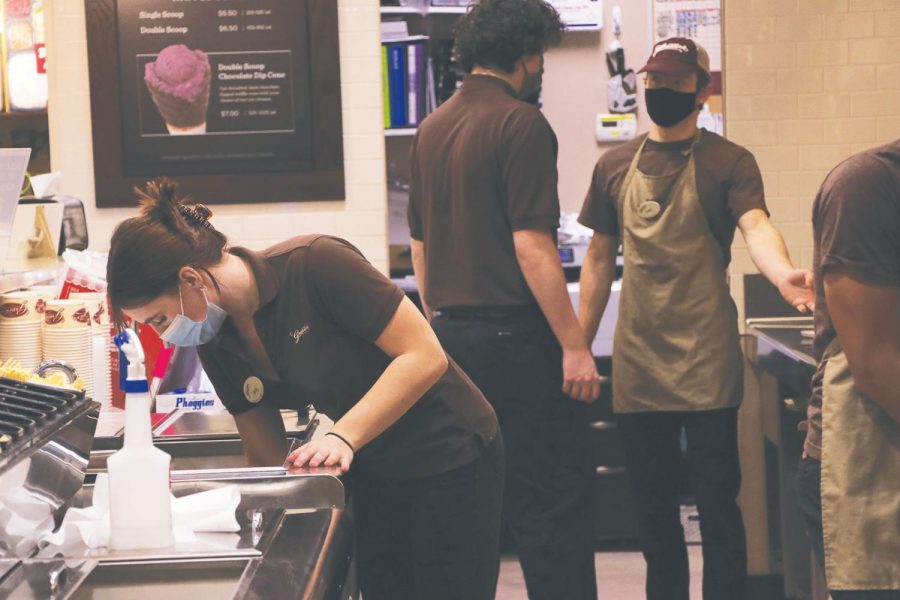Student workers endure labor shortage
During one of her Sunday morning shifts as a Starbucks barista, senior Peyton Reisman had to turn away two disappointed customers because they were trying to order by walking through the drive-thru line. At the time, the inside cafe was closed because the store was short-staffed. Like other students, Reisman has experienced many impacts of the current worker shortage caused by the pandemic.
“I was scheduled to work 25 hours a week during finals week [last June].
“We were super understaffed, so my boss really needed the coverage, but trying to balance 25 hours of work and studying for finals was incredibly difficult,” Reisman said.
Timothy Bond, associate professor of economics at Purdue University, said in a video conference that the labor force employment rate is approximately two percent lower than it was prior to the pandemic, and the hospitality industry is facing the largest number of job vacancies.
Employees are certainly working more and taking on more responsibilities because there are less workers, Bond said.
According to senior Brooke Waltenburg, she experiences the effects of the labor shortage while working at Francesca’s North.
Waltenburg has been a hostess at the restaurant for over two years and worked two days per week prior to the pandemic. This year, she was asked to work four days per week.
“I feel like I’ve had to work a lot more than I wanted to, and I still have to figure out a time to do all my homework and college applications,” Waltenburg said.
James Pierce, general manager at Francesca’s North, said in a phone interview that he expected workers to return after the end of stimulus checks, but that did not happen.
Pritha Chaudhuri, assistant professor of economics at Hamilton College, said in a video conference that workers are shifting out of the hospitality industry and into jobs that better suit their needs and comfort levels with COVID-19.
“A lot of new jobs are coming out … that people can do from home, so they can give more time to family,” said Chaudhuri. “I think in that case, just the entire [labor] market itself is kind of shifting in a different direction.”
According to Reisman, sometimes the only solution to the lack of workers is closing early because every employee has an important role in the store.
“One person makes a big difference,” said Reisman. “They are an entire spot. That one person could be taking care of [the] drive-thru, but if that one person isn’t there, then there’s no one to take care of [it].”
According to Bond, since many businesses were closed earlier on in the pandemic, consumers were spending less money. Now that businesses are reopening, the high demand from customers with available spending money is heightening the effects of the labor shortage in the hospitality industry.
Some workers have returned to work in the hospitality industry, but it is not enough to maintain the high demand, Bond said.
Senior Julia Bejm, a team leader at Graeter’s Ice Cream, said in a phone interview that throughout the summer of 2021, customers who were frustrated by changing COVID-19 restrictions were rude to Graeter’s staff, prompting many employees to quit.
It was difficult scrambling with 10 to 12 staff members when there are usually about 20, but a lot of people were just fed up with the rude customers, so they quit, Bejm said.
According to Reisman, customers often question why lines are longer than usual or why their orders are not ready quicker.
“If I could make a general announcement to the public … just be more understanding, especially during [COVID-19],” said Reisman. “So many businesses are struggling right now.”


